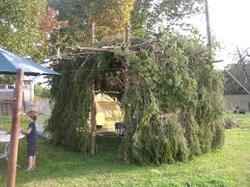
The Feast of Tabernacles and More - Part 3
Three times in a year shall all thy males appear before the LORD thy God in the place which he shall choose; in the feast of unleavened bread, and in the feast of weeks, and in the feast of tabernacles: and they shall not appear before the LORD empty: Every man shall give as he is able, according to the blessing of the LORD thy God which he hath given thee. (Deuteronomy 16:16-17)
THE JEWISH MALES WERE COMMANDED OF GOD to come to Jerusalem three times a year. These trips were called: “pilgrimages.” During the three pilgrimages, they would celebrate a total of seven feasts. The three trips/pilgrimages are named in the above verses.
(1)DURING THE FIRST TRIP/PILGRIMAGE IN EARLY SPRING, three feasts occurred. These three feasts occurred during “Passover Season.” The Feast of Unleavened Bread (which was seven days) followed Passover Feast, (which was one day.) A third Feast, The Feast of Firstfruits, occurred on the second day of The Feast of Unleavened Bread. Our purpose here is to merely mention these three feasts that occurred during the early spring pilgrimage to Jerusalem; not to explain them.
“THUS, THE CHRONOLOGY OF THE PASSOVER CONSISTED OF: Passover (Nisan 14), the Feast of Unleavened Bread (7 days, Nisan 15-21), and the Feast of Firstfruits (Nisan 16). The second day of the Feast of Unleavened Bread (Nisan 16) was also Firstfruits, a day simultaneously shared by both holidays. The Feast of Firstfruits marked the beginning of the spring barley harvest.” (Howard/Rosenthal)
(2)DURING THE SECOND TRIP/PILGRIMAGE, The Feast of Seven Weeks occurred. It took place seven weeks plus one day after the Feast of Firstfruits. It marked the beginning of the summer wheat harvest. A date was never assigned to this pilgrimage/feast. It occurred seven weeks plus one day (50 days) after the Feast of Firstfruits had passed.
Christians of today know about “the day of Pentecost” in the Book of Acts, but perhaps few know what “Pentecost” means or anything about its history. It simply beans “fifty.” (Penta=five) In Washington, D.C. we have the Pentagon, a five-sided building that houses the “brains” of our military.
And ye shall count unto you from the morrow after the sabbath, from the day that ye brought the sheaf of the wave offering; seven sabbaths shall be complete: Even unto the morrow after the seventh sabbath shall ye number fifty days; and ye shall offer a new meat offering unto the LORD. (Leviticus 23:15-16)
THIS IS THE "MIDDLE" OF THE SEVEN FEASTS and occurs by itself. At this assembly two loaves of leavened wheat bread were offered to the Lord, plus animal sacrifices. Ye shall bring out of your habitations two wave loaves of two tenth deals: they shall be of fine flour; they shall be baken with leaven; they are the firstfruits unto the LORD. (Leviticus 23:17)
“THE TEMPLE SERVICES FOR SHAVUOT (PENTECOST) followed much the same pattern as that of the Feast of Firstfruits since both holy days were celebrated with Firstfruit offerings. The waving of sheaves of barley and loaves of wheat bread acknowledged that the source of their bread and all food was from the eternal God. They could not partake of the new crops until the priest had waved the offerings before the Lord and acknowledged His provision.
(3) DURING THE THIRD TRIP/PILGRIMAGE, The Feast of Trumpets occurred. This feast coincided with Israel’s new year. (Rosh Hashanah) “It is the only Jewish holiday which occurs on the first day of the month of the New Moon, when the moon is dark and only a thin crescent. All other Jewish holidays occur later in their respective months when the moon is bright. Normally, the new moon was announced by short blasts of the trumpet, but the New Moon of the seventh month was celebrated by long blasts, emphasizing its solemnity and uniqueness among months.
“THE FEAST OF TRUMPETS IS THE FIFTH FEAST and Israel’s dark day. It occurs at the New Moon when the primary night light of the heavens is darkened. Israel’s prophets repeatedly warned of a coming dark day of judgment. They knew it as “the Day of the Lord,” that terrible period of time at the end of this age when the Lord will pour out His fiery judgment.” (Howard/Rosenthal)
THE DAY OF ATONEMENT IS THE SIXTH FEAST. The Feast of Tabernacles is the last of the seven feasts. We must do a brief study of “sevens” and then look at The Feast of Tabernacles, the last of the Seven Feasts. These brief comments on “The Feasts of the Lord,” do not constitute a “complete study” of the Feasts of the Lord. They merely announce them.” You may like to go to this site and see a modern Jewish take on their culture. Ω https://www.myjewishlearning.com/article/pilgrimage-festivals/
Read Through the Bible in a Year
OCTOBER 25, 2018 – THURSDAY
A.M. Jeremiah 14-16 P.M. 1 Timothy 5
(Bible Gateway will read this to you if you like. Look for the speaker icon.)
A Good Verse to Memorize:
He that is of God heareth God's words: ye therefore hear them not, because ye are not of God. (John 8:47)
Song for Today:
Take Time to be Holy
(2:43) (Calv. Mem.Church Choir)
https://www.youtube.com/watch?v=U6YGvp68iYc
You may have to adjust the volume or delete an ad.
 RSS Feed
RSS Feed
